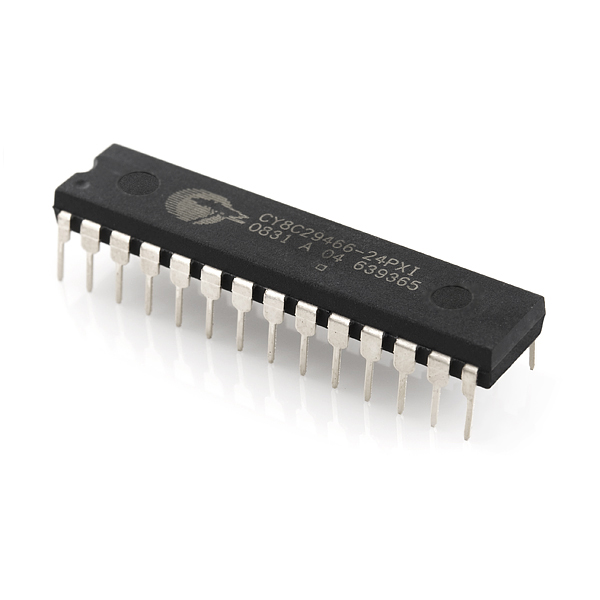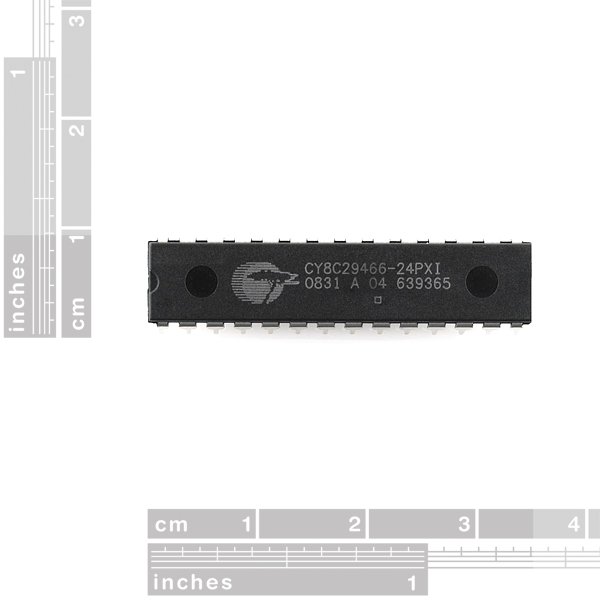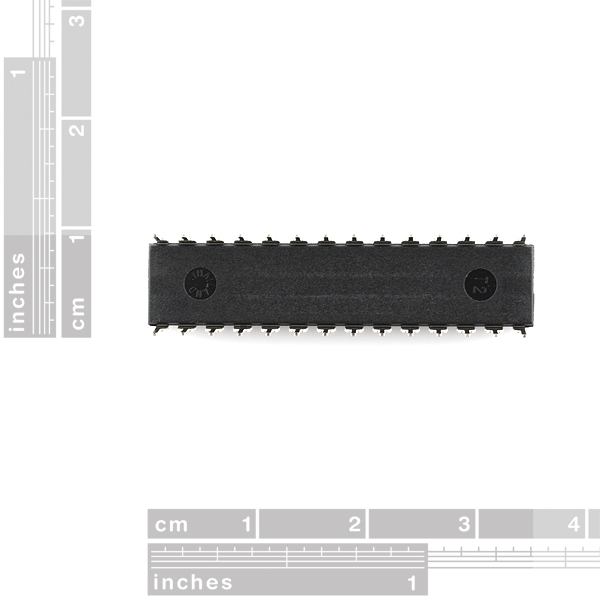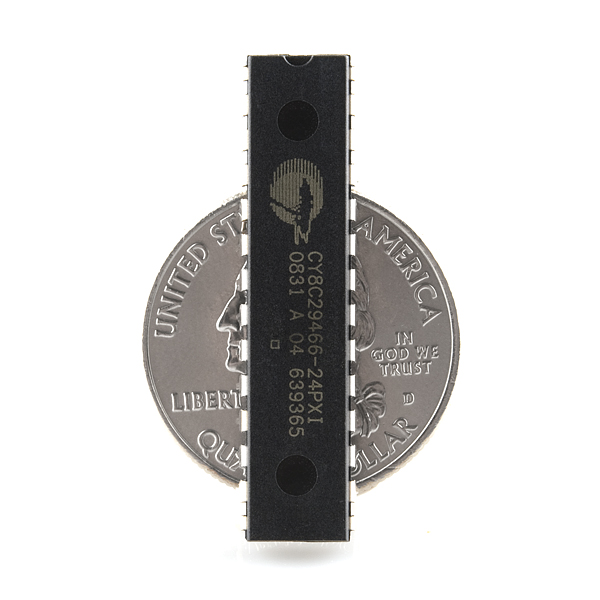Text to Speech chip for SpeakJet - TTS256
The TTS256 is an 8-bit microprocessor programmed with letter-to-sound rules. This built-in algorithm allows for the automatic real-time translation of English ASCII characters into allophone addresses compatible with the Magnevation SpeakJet Speech Synthesizer IC. Combine this with the SpeakJet to build a complete text-to-speech solution.
The TTS256 is offered in a through-hole, 28-pin package. Supplied power should be +5V. Very few connections are required for operation:
| Pin# | TTS256 | Pin# | SpeakJet |
|---|---|---|---|
| 5 | TX (sends serial data to host) | ||
| 14 | Vss (ground) | ||
| 18 | RX (received serial data from host) | 15 | Buffer Half Full |
| 20 | Ready | 10 | RX |
| 24 | SJ_TX | ||
| 28 | Vdd (+5V) |
The TTS256 contains over 600 rules for pronouncing English text. While it does a pretty good job of the task, with a less than 5% error rate in most sentences, it will mispronounce some words. Often times, some creative spelling will help.
- Narrow 28-pin DIP
- Companion chip to Magnevation SpeakJet and Savage Innovations SpeakGin
- Built in 600 Rule database
- 9600bps (8-N-1) serial interface (non-inverted TTL level)
- Generates speech codes from ASCII text
- Compatible with Arduino, Basic Stamp, OOPic, Pic, and any processor with serial output
Text to Speech chip for SpeakJet - TTS256 Product Help and Resources
Core Skill: Soldering
This skill defines how difficult the soldering is on a particular product. It might be a couple simple solder joints, or require special reflow tools.
Skill Level: Rookie - The number of pins increases, and you will have to determine polarity of components and some of the components might be a bit trickier or close together. You might need solder wick or flux.
See all skill levels
Core Skill: Programming
If a board needs code or communicates somehow, you're going to need to know how to program or interface with it. The programming skill is all about communication and code.
Skill Level: Rookie - You will need a better fundamental understand of what code is, and how it works. You will be using beginner-level software and development tools like Arduino. You will be dealing directly with code, but numerous examples and libraries are available. Sensors or shields will communicate with serial or TTL.
See all skill levels
Core Skill: Electrical Prototyping
If it requires power, you need to know how much, what all the pins do, and how to hook it up. You may need to reference datasheets, schematics, and know the ins and outs of electronics.
Skill Level: Competent - You will be required to reference a datasheet or schematic to know how to use a component. Your knowledge of a datasheet will only require basic features like power requirements, pinouts, or communications type. Also, you may need a power supply that?s greater than 12V or more than 1A worth of current.
See all skill levels
Comments
Looking for answers to technical questions?
We welcome your comments and suggestions below. However, if you are looking for solutions to technical questions please see our Technical Assistance page.
Customer Reviews
No reviews yet.





Here is my test video of speakjet + TTS256:
http://www.youtube.com/watch?v=5xNQAFs6mcI
Now you can add voice and sound effects to your projects!
can i change it french language?
Does anyone have a schematic showing how to hook up the speakjet to this text to speech chip? Not the voice box shield, but just both through hole parts? Also, I highly doubt it but does anyone know of the .HEX file that can be loaded onto the Cypress PSoC CY8C29466 IC? I have a ton of these chips laying around from an old PSoC 1 project I was doing a few months back.
When will this part be back in stock?
I found that it was something wrong with macbook serial. With external power or on windows pc it works great!
I've soldered TS256 to VoiceBox, but using example sketch it can only say 1 letter at once (or 1 symbol like $ or %).
When I'am trying to type in word or phrase it interrupts after one or two letters. What I'm doing wrong?
Nice! Somebody gave my board a free plug here :-) <br />
<br />
Thanks neufuture!
SpeakJet, TTS256, and Arduino....$76.85
MP3 Trigger with 1 GB uSD card...$59.90
(Building a speaking project? PRICELESS...ahem)
Excluding tax, etc. and how you power things, it's still quite a difference! Especially true if you simply want "canned" sentences. You may want to save the SpeakJet system for projects which require reporting of data/numbers that can vary.
Here is how:
http://www.droidbuilder.com/
How can I connect this to the voice box shield?